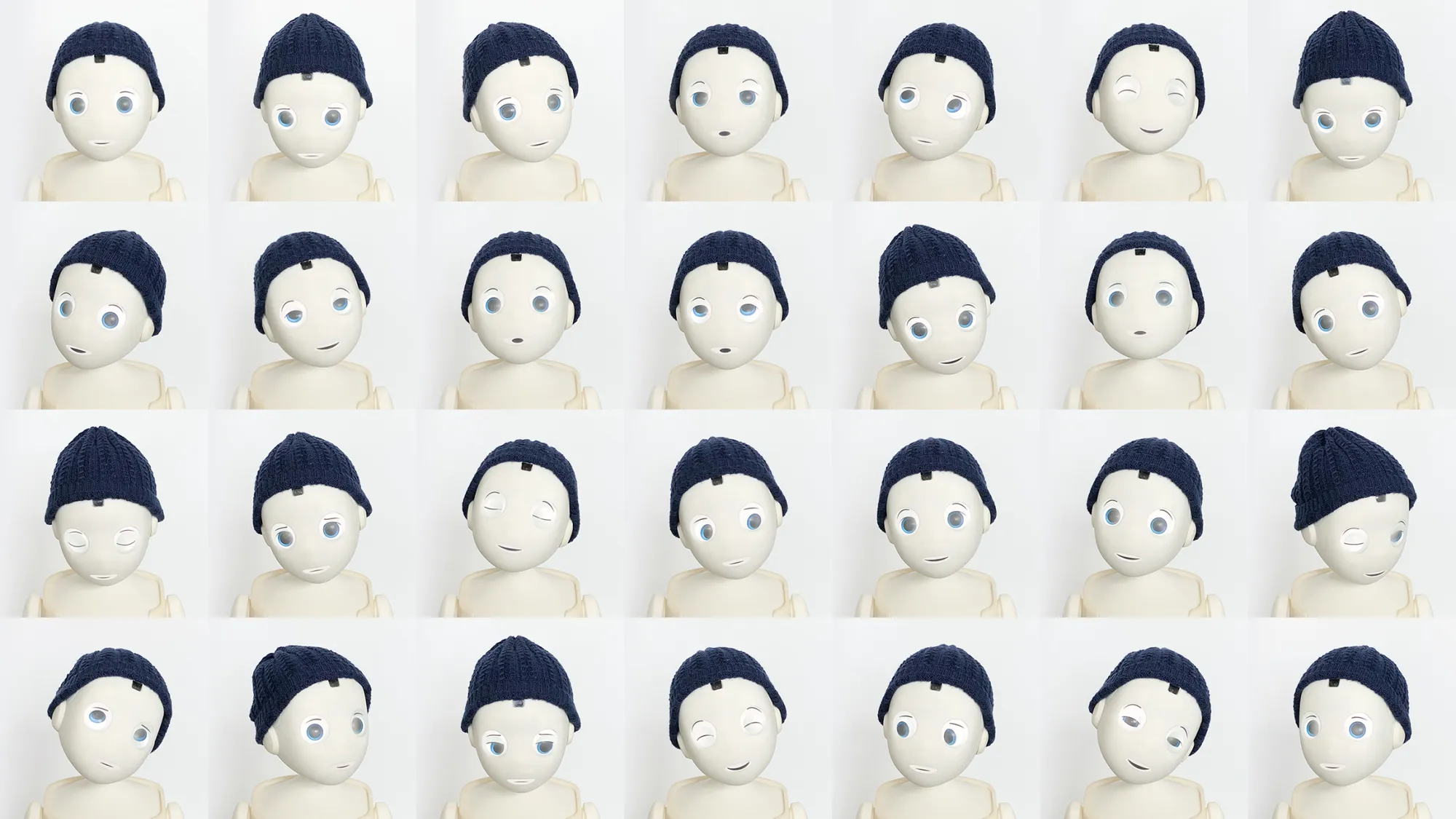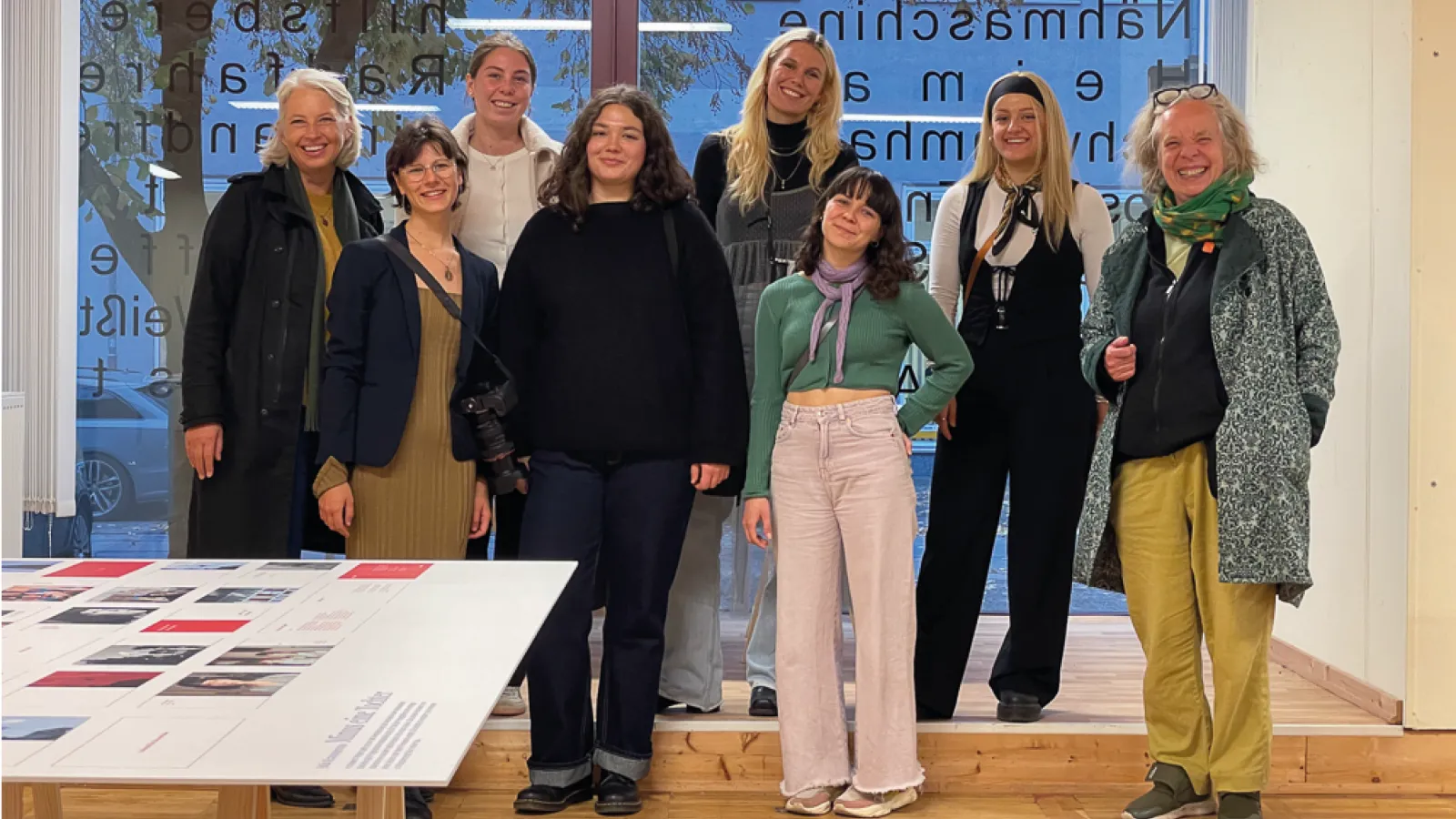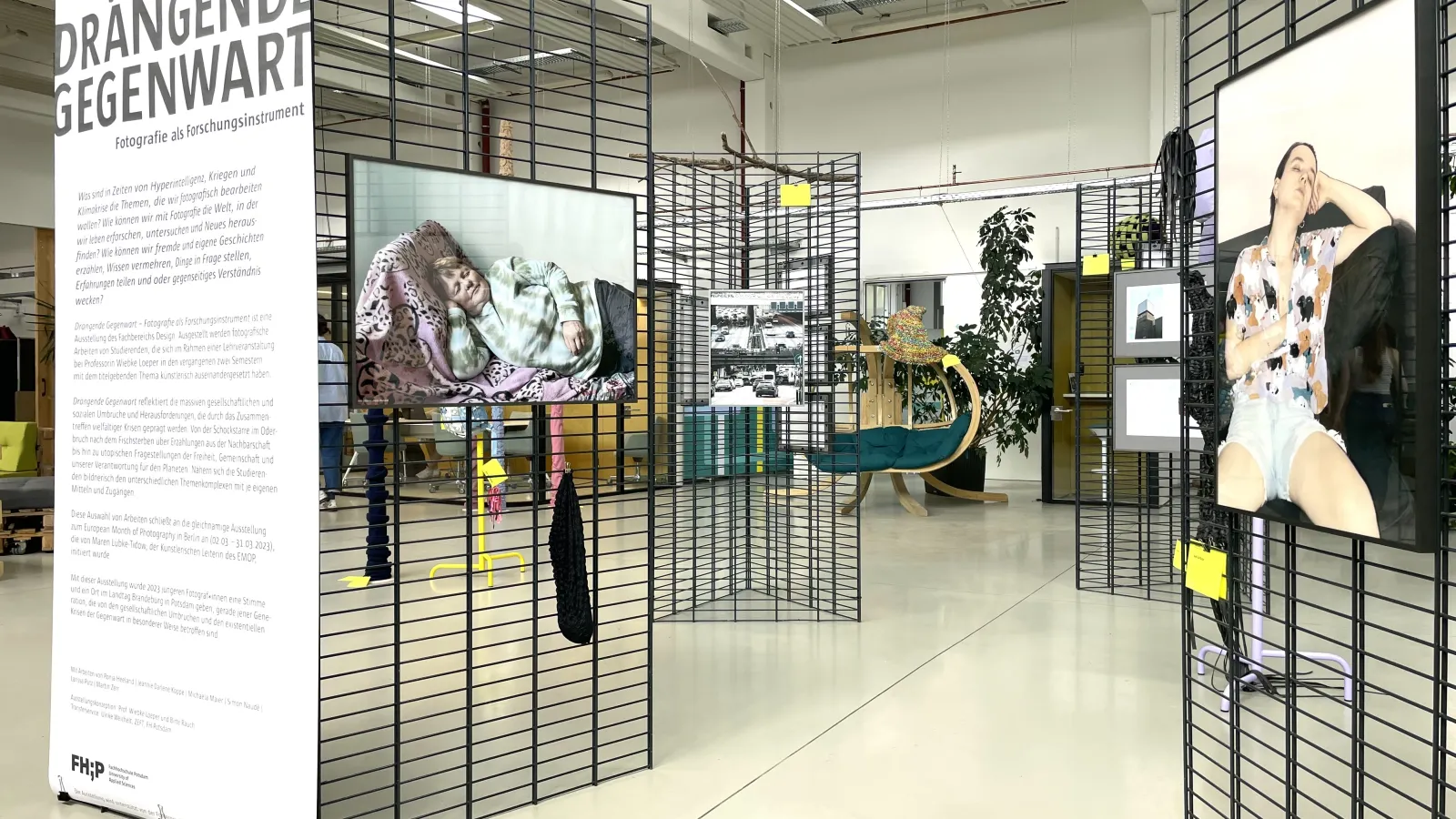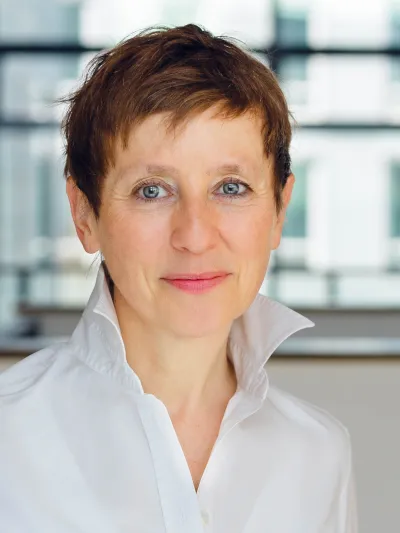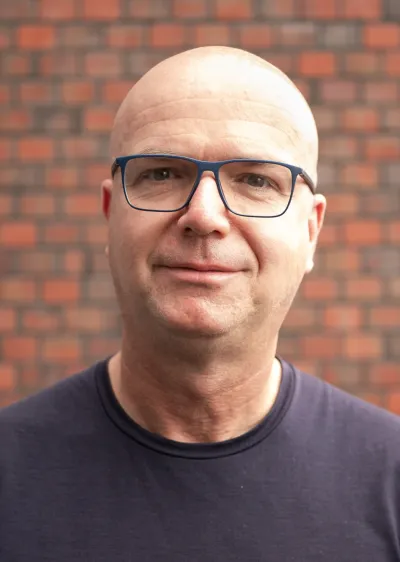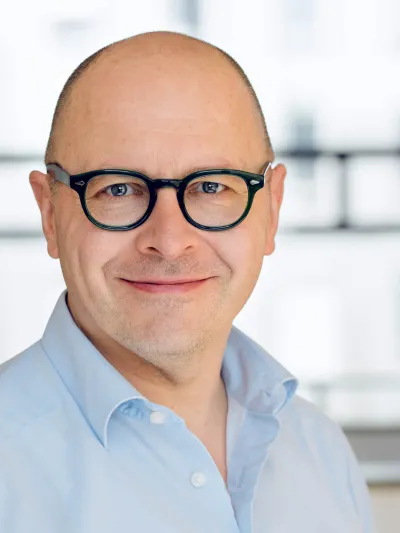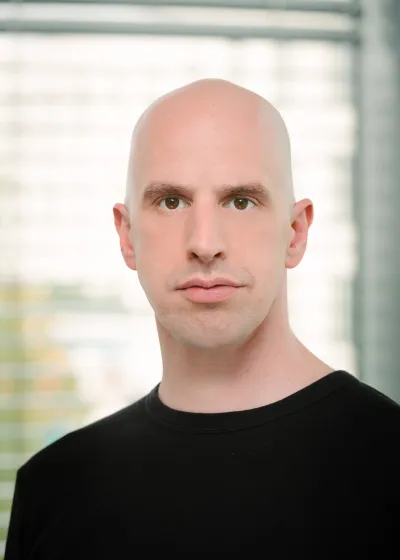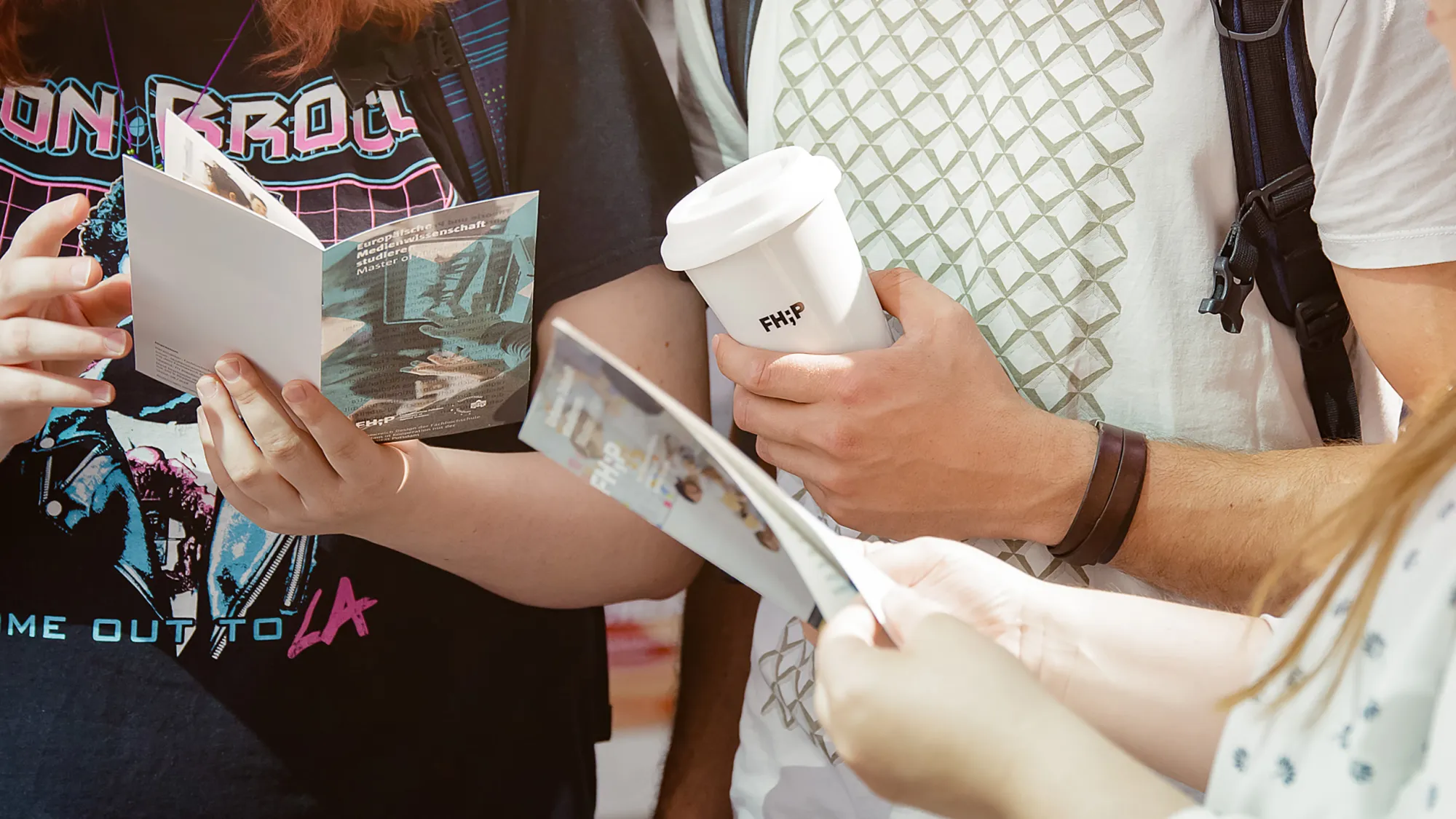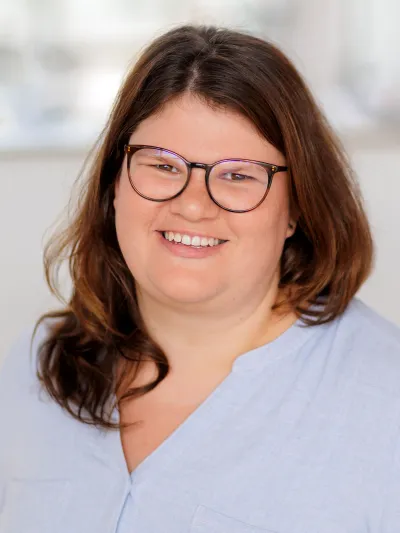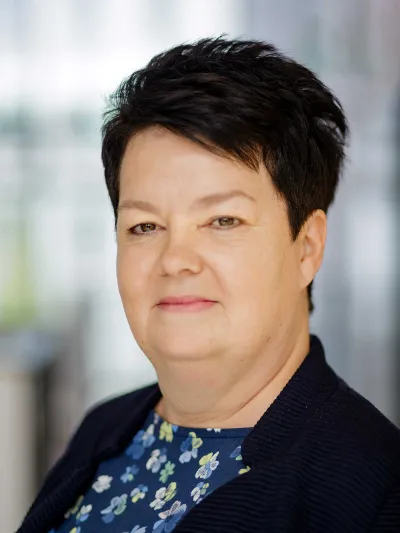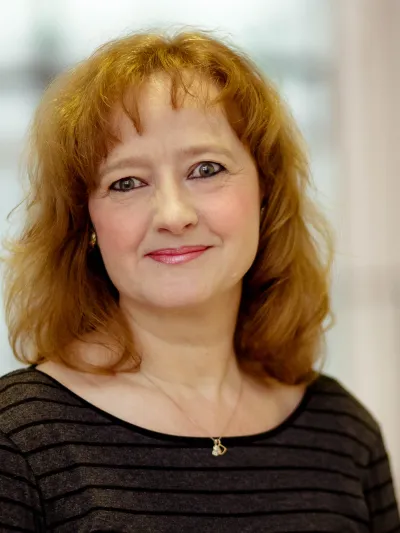The Master's degree programme in Design offers a unique way of creating space and time to develop ideas, concepts, objects, systems, interventions and experiences. The programme creates space for research, exploration, reflection and action in a socio-political climate that is currently particularly challenging. Embedded in a diverse community of designers and thinkers in the fields of communication, interface and product design, the Master's degree programme in Design offers time. Time to scrutinise, rethink and explore alternative paths for our present and possible futures. Join us on a transformative journey!
2 semesters
4 semesters
until 15.06.
15.06. - 15.08. (admission restricted)
60 ECTS credit points
120 ECTS credit points
Profile
Between strategy and speculation - the new Design Master's programme at the FHP
The new Master's degree programme in Design offers an inspiring learning atmosphere in which a research-oriented studio culture supports collaborative work and creative processes. Specialising in one of our studios, "Design as Strategy" or "Speculative Software", opens up a flexible, modular and interdisciplinary learning environment (German or English study track). The programme offers a wide range of courses in the fields of communication, interface and product design, in addition to laboratories with outstanding technological equipment. This allows you to design your own individual Master's programme. The programme focuses on a practice-oriented and theoretically sound examination of social transformation processes and interdisciplinary perspectives for the future.
"Designers" become "Deciders"
With its various disciplines, design provides a powerful set of tools for achieving entrepreneurial or social goals. In this studio, methods are developed and routines trained so that, in future, strategic considerations and decisions can be made together with clients prior to the actual design process.
Speculative Software
The studio pushes the boundaries of interaction design and invites students to speculate on current and future forms of software. As part of the studio, students will challenge current conventions, explore radical approaches to design and create new forms of digital interaction and representation.
Design in the poly crisis
The climate crisis, social polarisation and far-reaching technological transformations are shaping a present that holds more open questions than clear answers. The Master's degree programme in Design at the Potsdam University of Applied Sciences does not respond to this complexity with hasty solutions, but with a research-based and creative approach that recognises ambivalences and uses them productively.
At the centre of the study programme is design as a knowledge-oriented, research-based and creative design practice. Instead of one-dimensional narratives, the course teaches the ability to endure, analyse and creatively process complex areas of tension. Students learn to critically scrutinise dichotomous thought patterns, to resolve confrontation through a diversity of perspectives and to understand the spaces in between as relevant design spaces.
Design is understood both as a reflection of the existing as well as a speculative practice of future spaces of possibility. The degree programme opens up space for the examination of everyday, context-bound design situations as well as for the development of visionary scenarios that stimulate critical discussion of social futures. The projects are characterised by conceptual acuity, design excellence and discursive depth.
At a time when design methods are often propagated without reflection as all-purpose solutions, our Master's programme is a conscious counter-programme: it focuses on consolidation, depth of focus and a precise contextualisation of design processes. In the field of tension between acceleration and deceleration, the programme conveys a creative sense of rhythm - attentively, responsibly and with a feel for the right moment.

Research orientation
This attitude is reflected not only in the design projects, but also in the close connection between teaching and research. The Master's programme opens up a wide range of opportunities to explore design issues in depth in the context of current research projects and to combine theoretical reflection with practical research experience.
In the Master's programme in Design, you have the opportunity to actively participate in the research projects of our labs - Interaction Design Lab and Urban Complexity Lab - in parallel to your studio work. Whether through research-orientated courses or as a student assistant, you can gain valuable practical experience and deepen your knowledge. We also support your academic career with a seamless transition from the Master's to the PhD programme and founders with comprehensive advisory and support programmes.
Interaction Design Lab
The IDL is home to an international team of researchers, designers and developers with roots in science and industry. We create an interface between teaching, research, development, technology transfer, design and knowledge transfer and thus open up a space for multidisciplinary projects.
Urban Complexity Lab
The UCLAB is an interdisciplinary research group that combines expertise from the fields of interface design, computer science and the humanities. Its research work focuses on the design, development and investigation of data visualisations.
Does this degree programme suit me?
Do you want to deepen an existing interest in design? Do you want to complete your first degree with an internationally recognised qualification? Do you want to conduct both practical and theoretical research in a design discipline and are you interested in an academic career path in design research? Would you like to be accompanied and supported on the path to your own research question in an interdisciplinary and cross-disciplinary manner?
The Master's degree programme in Design at the FH Potsdam offers you these opportunities. You will solve problems on a formal, aesthetic and methodological level and will be able to penetrate and carry out extensive design, development and transformation processes in terms of form, content and structure. The systematic consideration of ecological necessity, social relevance, political and socio-economic framework conditions are an integral part of our understanding of design.
You have these qualities
- analytical and conceptual way of thinking
- a creative vision
- enjoy art, culture, design, media and technology
- Independence, communication, organisational and teamwork skills
Shop window
Let us inspire you! In our virtual showcase you will find current projects and works from the degree programmes of the Faculty of Design.
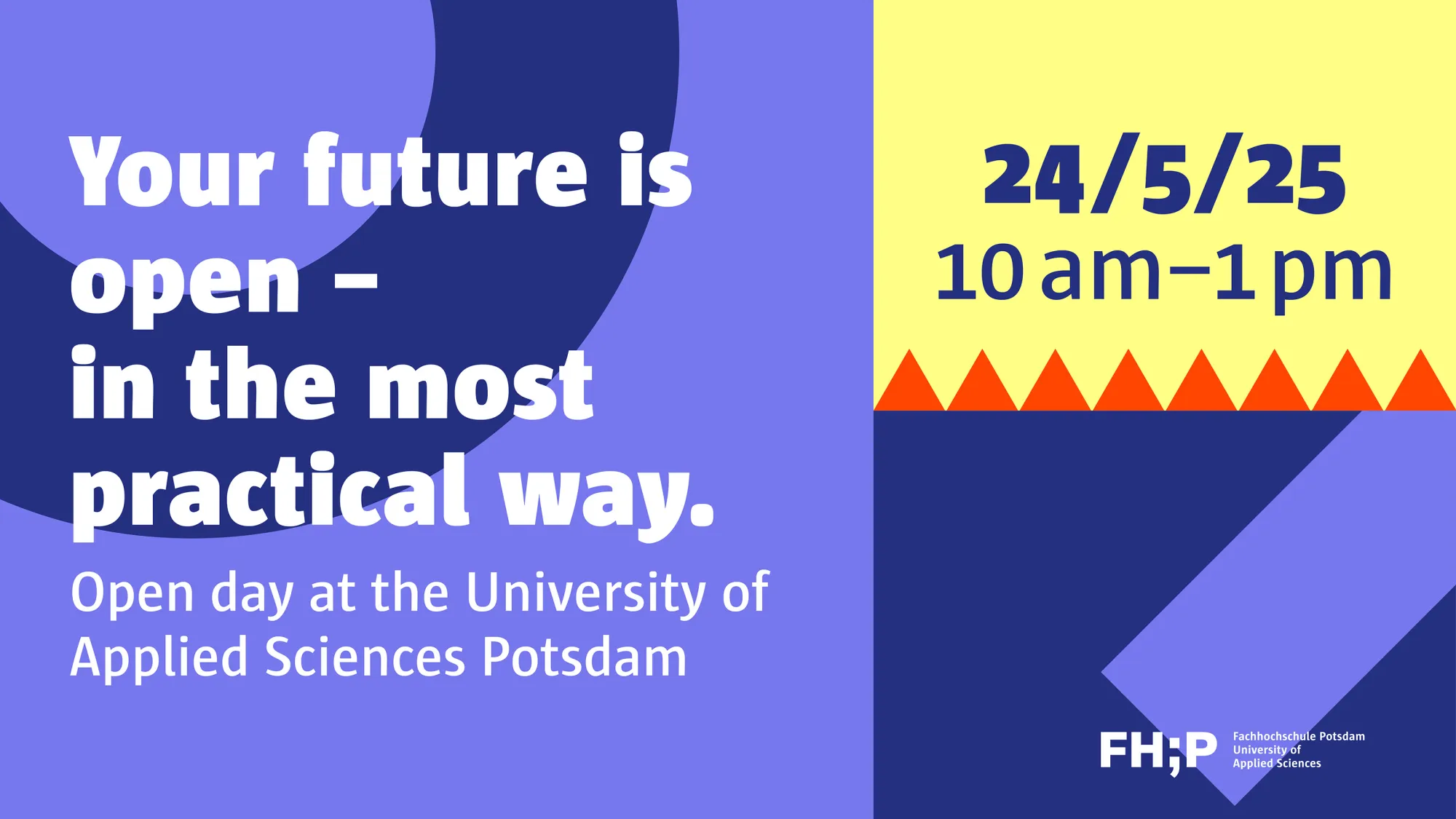
Info Day 2025: We open our doors
Open Day at the Potsdam University of Applied Sciences: On 24 May 2025, you will get to know the diverse study paths at our university, explore the campus and gain exclusive insights into our modern laboratories and workshops.
Take the opportunity to talk to students and lecturers in person and look forward to a varied programme.
Projects of the Design department
More projectsThe Opposite of Fear is Courage – Photography as a Tool
Under the direction of Wiebke Loeper, students from the Department of Design presented their photographic work as part of the exhibition "The opposite of fear is courage" at the Kulturhaus Wittenberge in November 2024.
International Study and Training Partnership with the National Taipei University of Technology (Taiwan)
Exchange programme for students and teachers within the framework of the DAAD ISAP programme
Drängende Gegenwart × Luckenwalde – Photographic and Textile Works
The exhibition ‘Drängende Gegenwart - Fotografie als Forschungsinstrument’ and ‘Drängende Gegenwart - textiles in transit’ combines photographic and textile works. The exhibition opening took place on the 6th of June 2024. The exhibition itself was on display at the Luckenwalde branch until the 27th of June 2024.
LAUBE focuses on Sustainability, Social Issues and Biodiversity
The allotment garden is changing – one driver of this change is the demographic development, which results in a generational change.
Contact us
The colleagues at the Central Student Advisory Service provide information to prospective students, first-year students, parents, teachers and students on all general questions relating to the degree programme. If you have specific questions and concerns about the Master's degree programme in Design, please contact the Student Advisory Service.
Student counselling
Student counselling
You may also be interested in these degree programmes
More courses| Department | Degree programme | Teaching language | Start of study | Application deadline |
|---|---|---|---|---|
| |
Urban Futures (MA) | German | Winter semester | 15/05 – 15/06 (restricted admission) |
Programme content
Programme content
The Master's degree programme in Design is offered as a one- or two-year full-time or part-time course and leads to a Master of Arts degree. The two-year study programme can be completed in either German or English. In co-operation with the National Taipei University of Technology (Taipei Tech), it is also possible to obtain a double degree.
The Double Degree is a joint study programme of the University of Applied Sciences Potsdam and Taipei Tech, in which you acquire two degrees: the Master of Arts and the Master of Design. You will complete certain coursework and examinations at both universities. The programme offers you an exciting international study experience and strengthens your career prospects through intercultural skills and subject-specific qualifications.
1st year of study - module plans and course of study
These modules await you in the first year of the Master's degree programme in Design. All module descriptions, the study and examination regulations and the statutes for the selection procedure can be found in one compact and clearly organised place.
2nd year of study - module plans and course of study
These modules await you in the second year of the Master's degree programme in Design. All module descriptions, the study and examination regulations and the statutes for the selection procedure can be found in one compact and clearly organised place.
Studio "Design as strategy"
Studio "Design as strategy"

The Master Studio Design as Strategy represents all relevant design disciplines as purpose-orientated "measures" to achieve a goal. In the studio, trained designers will develop into decision-makers and thus into advisory "counterparts" for clients.
Up to eye level: This "counterpart" begins at the briefing stage and thus well before the design practice. This is where the client's interests need to be heard, understood and assessed, the postulated goals critically scrutinised and, if necessary, discussed, and concrete design measures formulated and planned. The foundation for this is laid in the studio for "design as strategy": constructive listening and thinking, the ability to contextualise, an understanding of design as an "investment" and a realistic ability to assess the appropriate effectiveness of creative means. This requires mental mobility.
Into the fun: And it means: into the subject! By means of "design as strategy", reflected assessments are gained: about the initiators' self-image and understanding of the objective, about the economic, temporal, media, social and ethical conditions, about the players and reference groups, about the interests, wishes and resistance of all players, about potential touchpoints and about possible effects and consequences. It is analysed, classified, mapped, characterised and discussed. This is "understanding work". This is where the criteria for every recommendation and project planning are created.
Towards solutions: But how exactly can what be achieved and when? Based on an assessment differentiated as above, various scenarios with different measures are outlined. To do this, the consultant designers need in-depth knowledge of all conceivable design disciplines. Looking through the eyes of the client means being able to weigh up the objective, effort, development time, costs and benefits, project coherent measures and think in terms of resources and return on investment (ROI). Even the recommendation of design measures implies strategic considerations with regard to their specific effects and, above all, their purpose.
Let'sget down to reality: Is this design now or is it still to come? The studio for "design as strategy" is based on the observation that more and more original design tasks are being automated, supported by AI or carried out by amateurs themselves thanks to software such as Canvas. The market is shrinking and so is the quality. How do design professionals deal with this problem? What role do strategic considerations play in their day-to-day work? And what does this do to the role of designers? We ask successful graduates of the FH Potsdam across all design disciplines. And we develop methods as a framework and value proposition for a new generation of designers and their role as strategically thinking designers.
The studio for "Design as Strategy" is headed by Matthias Beyrow. He holds the professorship for "Identity and Sign" at the Department of Design at the FH Potsdam. His original field of teaching comprises holistic and above all applied communication for companies, administrations and institutions - in short: branding and campaigning. His Corporate Identity & Corporate Design Compendium emphasises the potential of different design disciplines for holistic design strategies.
If you would like to apply for the Masterstudio "Design as Strategy", we cordially invite you to take part in our online information event on 22 May 2025.
Contact us
Studio "Speculative Software"
Studio "Speculative Software"
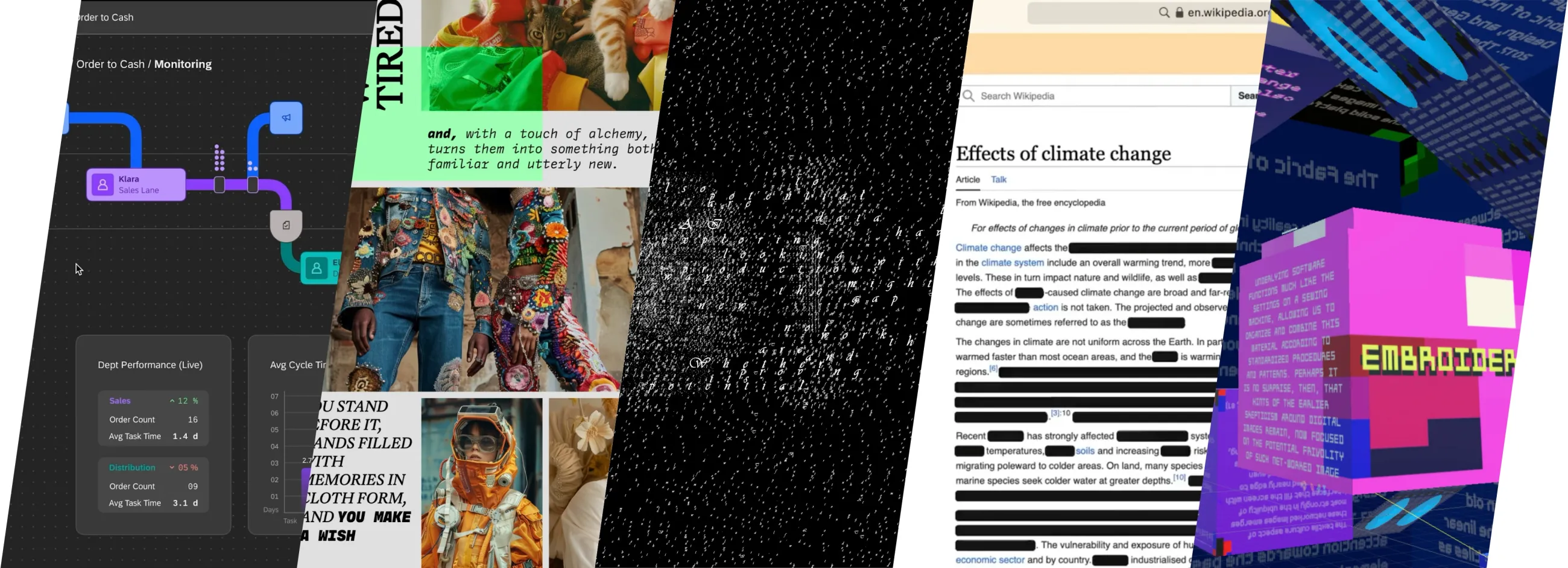
The Master's programme "Speculative Software" is dedicated to the design and research of creative, experimental software interfaces. It is part of a two-year full-time Master's programme taught in English.
The studio pushes the boundaries of interaction design and invites students to speculate on current and future forms of software. As part of the studio, students will challenge current conventions, explore radical approaches to design and create new forms of digital interaction and representation.
The studio covers a wide range of topics and is structured around three perspectives: Technology, Speculation and Communication. In the first semester, students are introduced to current technologies such as extended reality (XR), web technologies, artificial intelligence, spatial typography, robotics, data visualisation and software prototyping. The second semester focuses on theory, thesis development and design discourse and deals with topics such as speculative design, human-computer interaction, cultural theory and media theory. The third semester focuses on strategic communication, while the fourth semester is dedicated to the Master's thesis.
Students benefit from a broad spectrum of practical and theoretical perspectives within the Department of Design. Lecturers from various disciplines are involved in teaching within the framework of workshops. As part of the Master's programme, students also have the opportunity to take electives from across the department, providing an interdisciplinary learning experience.
Those enrolled in the Speculative Software Studio can also participate in a double degree programme with the National Taipei University of Technology (Taipei Tech) in Taiwan.
The Speculative Software Studio emphasises critical reflection and encourages students to consider the cultural and ethical implications of software design. Graduates develop the ability to create forward-thinking and inspiring design concepts - from digital art installations to experimental software platforms. The studio welcomes applicants from diverse backgrounds. We are looking for students with a high level of curiosity and commitment.
The studio is headed by Boris Müller, Professor of Interaction Design and Co-Director of the Urban Complexity Lab. The Urban Complexity Lab (UCLAB) is a research group with a focus on data visualisation and explorative design. The studio thus refers to innovative and experimental design research. Boris Müller recently gave a TEDx talk on Speculative Software, in which he presents his distinctive perspective on design and research. He widely publishes articles on interaction design and design research on his blog.
If you are interested in applying for the Speculative Software Master's programme, we invite you to join our online info event on 22 May 2025.
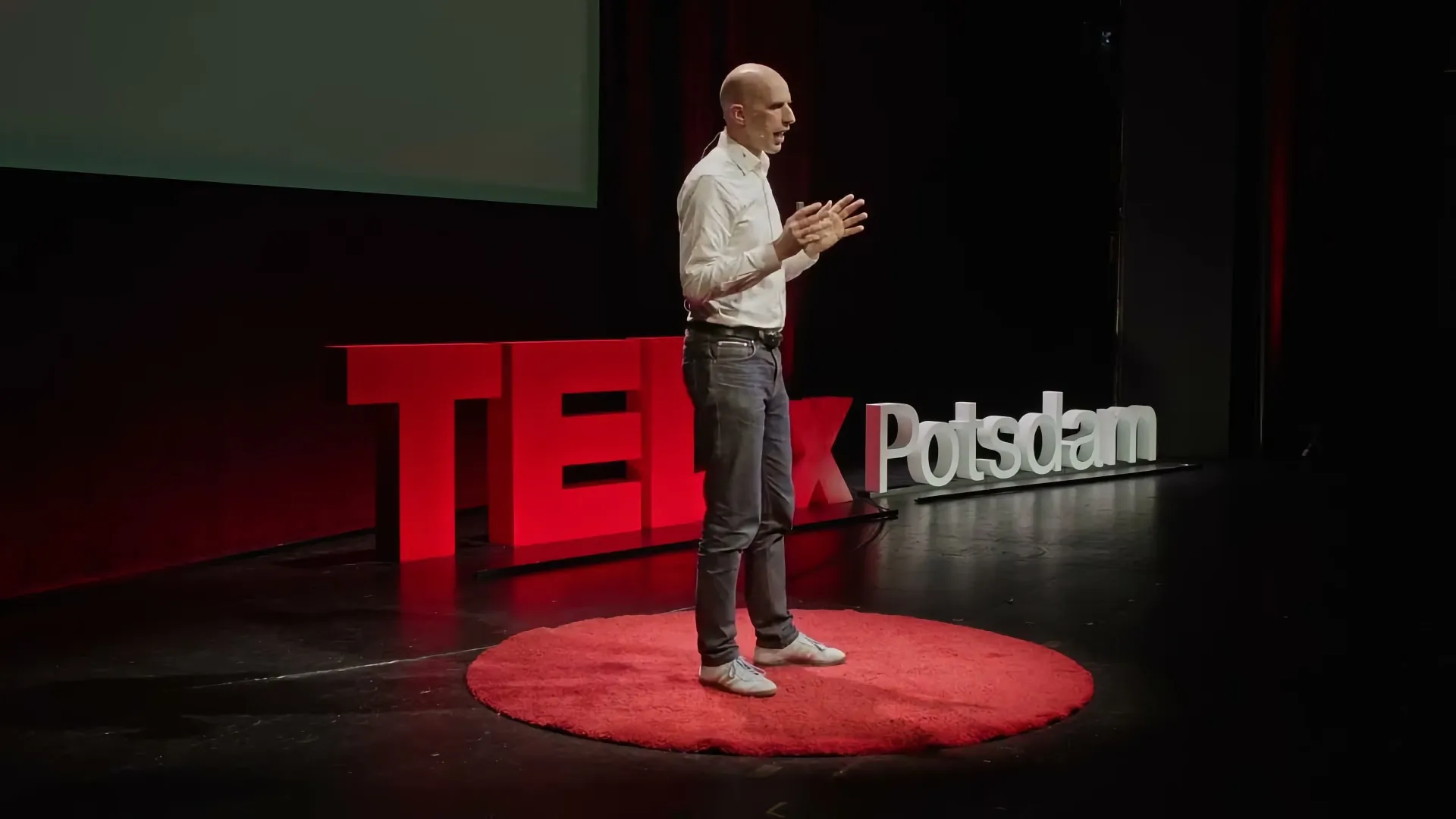
TEDx "The Art of Speculative Software"
We spend almost 8 hours a day in front of a screen - but is the software we use really well designed? On 6 November 2024, Boris Müller gave a talk on this topic at the TEDx conference in Potsdam. He argues that software is the dominant medium of our time, but that it usually lacks creativity and vision. In his talk, he questions conventional UX paradigms and introduces the concept of "speculative software".
Contact us
Application & Contact
Dates & requirements
The Master's programme is aimed at Bachelor's graduates from the fields of design and art as well as related design or art-oriented disciplines (e.g. architecture). Applicants from media, information and communication sciences, media informatics and similar fields are also welcome, provided they are interested in design and design science issues and can demonstrate specialised design knowledge.
The most important deadlines, dates and admission requirements for the Master's degree programme in Design can be found in the next section.
Dates
- 22 May 2025: Digital Master's Info Day, presentation of the studios, Q&A session
- 24 May 2025: Open day at the FH Potsdam
- Until 15 June: Registration for the aptitude test
- Mid-July: aptitude test, online
- by 15 August: Submit online application for a place on the course
Admission requirements
- first professionally qualifying university degree (at least 180 ECTS credit points) in a design degree programme or a design-oriented degree programme at a university of applied sciences, university of applied sciences or university of the arts
- Passed aptitude test
How to apply!
In the following, we explain which aspects you should consider from the application for the aptitude test to enrolment.
Project outline
The project outline is a key requirement for admission to the Master's programme in Design. It should develop a well-founded position on the chosen study topic on a maximum of two pages. This can take the form of one or more research questions as well as initial approaches for a practical, aesthetic-artistic or scientific examination of the topic.
Whether problem solving, speculative design or artistic intervention - the perspectives on the studio are diverse, as is the possible form of the sketch. It can be exclusively text-based or include visual elements such as photographs, illustrations, user interfaces or infographics.
Your project outline, the presentation in the aptitude test and your portfolio will be assessed according to these criteria:
Project outline
- Originality: level of innovation and independent interpretation of the study topic, be it aesthetic-artistic or methodological-scientific
- Quality of content: Clarity of the problem, technical depth and conceptual derivation
- Thematic fit with the studio: Examination of the thematic link to relevant issues of the selected studio from various design-specific perspectives
Presentation & discussion
- Presentation & communication: comprehensibility, strength of argumentation and response to queries
Portfolio
- Portfolio quality: creative, technical and methodical realisation of previous work (our portfolio concept is broadly defined and refers to a variety of creative forms of expression, e.g. also texts or software)
- Artistic and creative design skills: creativity, improvisation, abstraction and technical skills
Further information
Under the following links you, and especially international applicants, will find further information on the topics of application and enrolment at the University of Applied Sciences Potsdam.
International applicants
Would you like to apply for a degree programme from the first or a higher semester and have obtained your school-leaving certificate and/or university degree abroad? Then you can have your qualifications and achievements from abroad recognised and study with us.
Application & enrolment procedure
The Application and Study Service provides information and advice on general questions about the application process, admission and enrolment at the University of Applied Sciences Potsdam, application for a higher semester, but also on topics such as compensation for disadvantages, part-time study, waiting semesters and hardship applications.
Contact & Services
The Central Student Advisory Service provides information and advice on general questions about studying as well as on topics such as choosing a course, application, enrolment and study organisation.
The Student Advisory Service is the right place to go for subject-specific questions about module content, credit transfer, examinations or specialisations in the Design degree programme.
Student counselling
Student counselling
Study and Examination Service
Study Info Service
studien-info-service@fh-potsdam.de
bewerbungs-service@fh-potsdam.de
campuskarte@fh-potsdam.de
Study Service
studien-service@fh-potsdam.de
Exam Service
pruefungs-service@fh-potsdam.de
Family Affairs Commissioner
Office hours
Tue and Thu 9.30 am – 1.30 pm
Commissioner for University Employees with Impairment
Office hours
by arrangement



